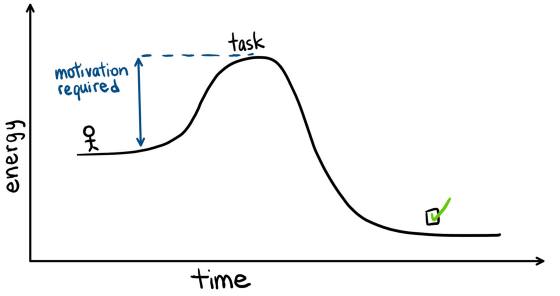'Don't think' is important in order not to procrastinate what you don't want to do

From studying to cleaning the floor, everyone has something they don't want to do. For Tiffany Matthé, who studies basic engineering at the University of British Columbia, “what I have to do but don't want to do” was an exercise. Matthé spent five years on 'procrastinating' exercise, but then succeeded in getting the exercise habits. Mr. Matthé has spelled out the important points to do what he doesn't want to do.
The Art of Not Thinking | Tiffany Matthé
Matthé didn't do any exercise during the last five years, but he did occasionally work out while watching YouTube, running with his brother, and so on. Matthé was not disliked by exercise, he felt refreshed after exercise, but he said he was depressed when trying to repeat the same thing the morning after exercising.
After some experience, Matthé realized at one point that 'the hardest part is 'starting' rather than 'while doing'. Once I started exercising, I was always focused and able to finish to the end.
Below is what Matthé illustrated about the energy needed to do something. The vertical axis shows the amount of energy and the horizontal axis shows the time, and you can see that motivation is required until the task is started. Matthé says the amount of energy needed to get to the task is similar to an exothermic reaction .

In an exothermic reaction, the reaction requires a minimum activation energy to occur, and once the reaction has occurred, the reaction settles in a lower energy state. If we apply this to the process of 'doing what we don't want to do', it means that the person (reactant) needs motivation (minimum activation energy) to execute (react) the task.
You can't get the activation energy, or motivation, without activity, but fortunately there isn't much energy needed. According to Matthé, what you must not do at this time is 'search for motivation'.
When people look for motivation, they think about the benefits of performing a task. However, the human brain is like an infant, and when trying to think about a certain direction, the opposite thought comes to mind strongly. When the brain thinks it has “choices,” it causes “discussion” and creates “deficiencies” and “alternatives” for tasks. The need for energy to resist this increases the minimum activation energy, making the task more difficult to perform.

On the other hand, if you don't think about the task, you can avoid having to discuss it yourself or create an alternative.
However, even if it is important not to think, it is extremely difficult to actually 'execute without thinking.' So Matthé cites a method of 'deciding what to do in advance'. The first method of 'deciding in advance' devised by Matthé is to decide in advance the rule 'I will do everything that can be done within 2 minutes'. When clothes are scattered on the bed, it doesn't take more than two minutes to get things organized, so you can follow the rules and do without thinking or discussing in your head.
The second method is to 'plan ahead'. Planning in minutes before you go to bed and acting on schedule in the morning is another way to act without thinking. It's not always successful, but it's worth testing because people can make rational decisions the farther away they are from taking action.

Also, starting from the simple or trivial part of the task is mentioned as a way to avoid procrastination. If you don't like to write about yourself on the scholarship application and you have to put it off, put your points at the top instead of long sentences. It is possible to immerse yourself in the work itself and continue the task while doing trivial work for about 5 minutes.
Matthé overcame the procrastination by using the above method. Matthé told him that he would 'exercise for 5 minutes every other day,' so that he could exercise for at least 15 minutes without thinking.
'Don't think' can be very powerful when you do something you don't want to do. But on the other hand, Matthé thinks it won't work without a pursuit. Matthé recommends that you take the time to set the overall goal of the action, and when you are confident that you really want to do it, stop thinking and become a robot.
Related Posts:
in Note, Posted by darkhorse_log







